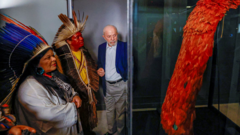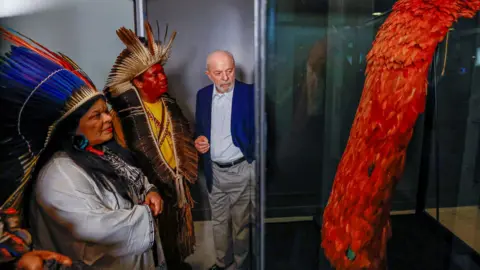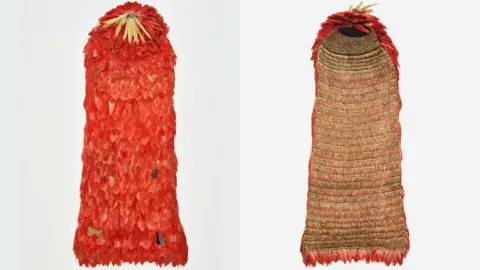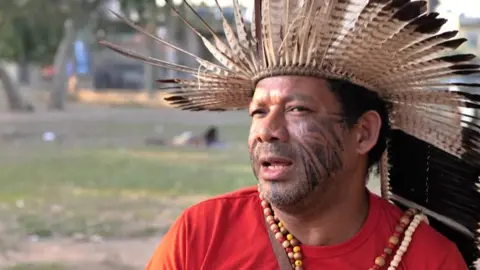This website uses cookies so that we can provide you with the best user experience possible. Cookie information is stored in your browser and performs functions such as recognising you when you return to our website and helping our team to understand which sections of the website you find most interesting and useful.

 Reuters
ReutersIndigenous leaders in Brazil have celebrated the return of a sacred cloak that had been on display at a Danish museum for more than 300 years.
The 1.8m-long cloak, made of 4,000 red feathers from the scarlet ibis bird, was officially unveiled at a ceremony in Rio de Janeiro. It was attended by President Luiz Inácio Lula da Silva.
The cloak was taken from the Tupinambá people during the Portuguese colonial period and had been on display in Copenhagen since 1689.
Indigenous leaders say its return highlights the importance of demarcating their ancestral lands to keep their traditions alive.
 Roberto Fortuna, the National Museum of Denmark
Roberto Fortuna, the National Museum of DenmarkA group of 200 Tupinambá people camped outside the building, with drums and pipes filled with medicinal herbs, waiting to see the precious cloak and to reconnect with their ancient traditions.
Yakuy Tupinambá travelled more than 1,200km (745 miles) by bus from the eastern Olivenca municipality to see the garment.
"I felt sadness and joy. A mixture between being born and dying," he told the AFP news agency.
“Our ancestors say that when they [the Europeans] took it away, our village was left without a north," indigenous chief Sussu Arana Morubyxada Tupinambá said.
Several Tupinambá sacred capes, which have survived hundreds of years, are still on display in museums across Europe.
They are thought to date back to the 16th Century.
 AFP
AFPTupinambá leaders say this is not just about bringing artefacts back to their original homelands, but about recognising indigenous people, their lands and rights.
Brazil's president has previously pledged to recognise indigenous land reserves, but the Tupinambás' territory has not yet been formally demarcated by the government.
Speaking at the event President Lula said: "I am also against the time limit on Indigenous land claims.
"I made a point of vetoing this attack against the indigenous peoples. But the National Congress, using a prerogative backed by law, overruled my veto. The discussion continues in the Federal Supreme Court.
"And my position has not changed: I am in favour of the rights of the indigenous peoples to their territory and culture, as established by the Constitution.
"Therefore, I am against the absurd idea of the limit on land claims."
The Tupinambás say the mineral-rich territory is being devastated by large agriculture and mining businesses.



 Africana55 Radio
Africana55 Radio 

